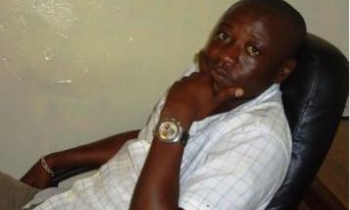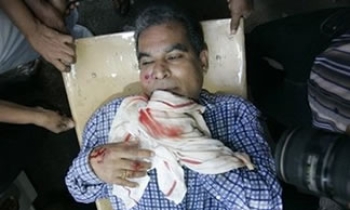In a continued effort to suppress reform-minded critics, the Iranian government has sentenced yet another prominent journalist, Ali Farahbakhsh, to three years in jail and slapped him with a huge fine, partly due to a typo in the court documents.
Farahbakhsh was convicted of spying in a trial held behind closed doors on Mar. 26. He was first imprisoned five months ago on his return to Iran after participating in a conference on the news media organised by civil society groups in Bangkok, Thailand. His lawyer has appealed the sentence.
Farahbakhsh was arrested on Nov. 26 and held in solitary confinement for 40 days, until the Association of Iranian Journalists issued a statement publicly revealing the details of his case. The security forces had pressured his family to remain silent about his arrest, which was only confirmed on Jan. 7 by the director of Tehran's prison department, Sohrabe Soleymani.
Badri Alereza, Farahbakhsh's mother, told IPS that he had a heart attack in prison and needed serious medical care. Since his arrest, security agents have tried to get him to "confess" that his attendance at various conferences abroad was part of a foreign power's covert plans to incite Iranians against the government. But Ali has refused to do so, she said.
Human rights groups inside and outside Iran have repeatedly asked the Iranian government to provide a legal basis for his arrest, and to allow him to hire a lawyer. However, authorities refused him access to legal counsel until one day before his trial. On Mar. 30, Reporters Without Borders called for Farahbakhsh's immediate release.
In an open letter to Ayatollah Mahmoud Shahroudi, the head of Iran's judiciary, Farahbakhsh's family asked him to release their son on bail and let him hire a lawyer. A week later, Ayatollah Shahroudi responded to their request positively, and wrote a note to the justice authorities in Tehran asking them to release him on bail and hold a fair trial.
"The judge for the case defiantly told me that he would not follow the instructions of the head of Iran's judiciary to release Ali on bail," Badri Alereza said a phone interview from Tehran. "This makes one wonder: when the words of the head of the judiciary are ignored, how can one expect them to listen to me? Mr. Shahroudi even sent a letter to the head of Tehran's judiciary explaining that an injustice was being done to my son."
Dr. Hadi Ghaemi, a Middle East and North Africa expert at Human Rights Watch, told IPS that the persecution of Ali Farahbakhsh is just another example of the Iranian government's determination to isolate Iranian journalists and activists.
"During the past six months, we have witnessed a concerted effort by the intelligence ministry to punish individuals who maintain close contacts with the international community," Ghaemi said. "Dozens of journalists and activists are banned from leaving the country and the government has imprisoned several people for attending conferences and seminars abroad."
Ali is accused of accepting 2,300 dollars from "foreigners", and to make matters worse, his sentence erroneously refers to his acceptance of 23,000 dollars. His has been ordered to pay three times that amount as his fine, meaning he is supposed to come up with 69,000 dollars, even though the judge had admitted that the number was a typo.
"They have made a mistake in the sentence. They added a zero the sum of money that they claim my son received from foreigners. In the charges brought against my son, the amount that is mentioned is 2,300 dollars. But the judge changed that to 23,000 dollars. My husband says the charge is a joke. How could anyone be a spy for 2,300 dollars? Nobody believes that."
"By accusing Farahbakhsh of espionage, simply for accepting a small financial compensation to attend an international conference, the government is making an example for others to stay away from such forums and interactions," stated Dr. Ghaemi.
"The Iranian government today is totally obsessed with what it believes to be an American drive to instigate a 'velvet revolution' in Iran," he added. "Their perception is particularly influenced by the State Department's announcement to provide financial assistant to Iranian civil society actors last year. While there is no evidence of anyone inside Iran accepting this offer -- indeed Iranian activists have strongly condemned this announcement -- people like Farahbakhsh and others are paying a heavy price because of it."
Last May, agents from Iran's intelligence service arrested Ramin Jahanbegloo, a prominent scholar, at Tehran's airport when he returned from a research trip in India. "He had relations with foreigners," said Intelligence Minister Moseni Ejeyee.
And in another blow to freedom of expression in Iran, security forces arrested three members of a 15-woman delegation of journalists en route to a training workshop in the U.S. state of Indiana on Jan. 25, accusing them of violating national security interests and threatening them with trial. They spent one night in notorious Evin prison before they were released on bail.
During the last several years, numerous influential journalists and civil society activists have been summoned, interrogated and even arrested about their activities and connections to countries outside Iran -- especially the United States, called the "Great Satan" by Ahmadinejad's mentor, Ayatollah Khomeini. Including Farahbakhsh, there are now six journalists in prison in Iran.
Interestingly, during the same time, governmental bodies have accelerated their support for religious organisations.
In the past few months, security forces have shown particular interest in the ties between journalists, intellectuals, and activists and organisations abroad. However, not a single accusation against anyone has been proven to date.
"I hope the sentence will be changed in the appellate court. We plan to sue the judiciary for causing us such distress in the mistake they have made," Farahbakhsh's mother told IPS. "But when the word of the chief of the judiciary branch is not upheld, how can we expect our efforts to succeed?"
*Omid Memarian is an Iranian journalist and civil society activist. He has won several awards, including Human Rights Watch's highest honour in 2005, the Human Rights Defender Award.









